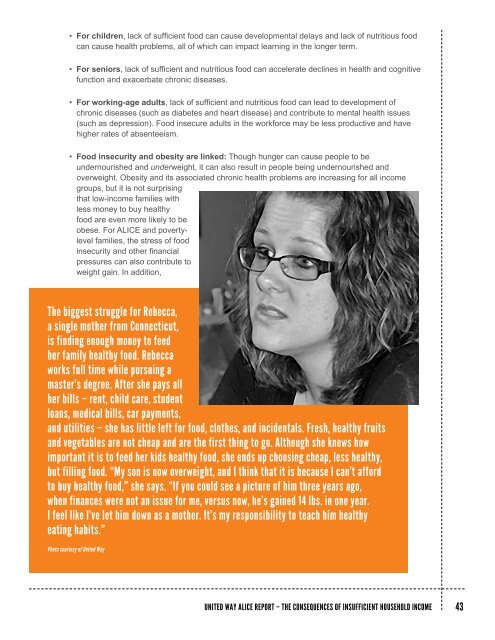The Consequences of Insufficient Household Income
This new Consequences of Insufficient Household Income report provides a deeper level of understanding of the choices that ALICE and poverty-level families across the country make when they do not have enough income or assistance to afford basic necessities, and the consequences of those choices.
This new Consequences of Insufficient Household Income report provides a deeper level of understanding of the choices that ALICE and poverty-level families across the country make when they do not have enough income or assistance to afford basic necessities, and the consequences of those choices.
You also want an ePaper? Increase the reach of your titles
YUMPU automatically turns print PDFs into web optimized ePapers that Google loves.
• For children, lack <strong>of</strong> sufficient food can cause developmental delays and lack <strong>of</strong> nutritious food<br />
can cause health problems, all <strong>of</strong> which can impact learning in the longer term.<br />
• For seniors, lack <strong>of</strong> sufficient and nutritious food can accelerate declines in health and cognitive<br />
function and exacerbate chronic diseases.<br />
• For working-age adults, lack <strong>of</strong> sufficient and nutritious food can lead to development <strong>of</strong><br />
chronic diseases (such as diabetes and heart disease) and contribute to mental health issues<br />
(such as depression). Food insecure adults in the workforce may be less productive and have<br />
higher rates <strong>of</strong> absenteeism.<br />
• Food insecurity and obesity are linked: Though hunger can cause people to be<br />
undernourished and underweight, it can also result in people being undernourished and<br />
overweight. Obesity and its associated chronic health problems are increasing for all income<br />
groups, but it is not surprising<br />
that low-income families with<br />
less money to buy healthy<br />
food are even more likely to be<br />
obese. For ALICE and povertylevel<br />
families, the stress <strong>of</strong> food<br />
insecurity and other financial<br />
pressures can also contribute to<br />
weight gain. In addition,<br />
<strong>The</strong> biggest struggle for Rebecca,<br />
a single mother from Connecticut,<br />
is finding enough money to feed<br />
her family healthy food. Rebecca<br />
works full time while pursuing a<br />
master’s degree. After she pays all<br />
her bills – rent, child care, student<br />
loans, medical bills, car payments,<br />
and utilities – she has little left for food, clothes, and incidentals. Fresh, healthy fruits<br />
and vegetables are not cheap and are the first thing to go. Although she knows how<br />
important it is to feed her kids healthy food, she ends up choosing cheap, less healthy,<br />
but filling food. “My son is now overweight, and I think that it is because I can’t afford<br />
to buy healthy food,” she says. “If you could see a picture <strong>of</strong> him three years ago,<br />
when finances were not an issue for me, versus now, he’s gained 14 lbs. in one year.<br />
I feel like I’ve let him down as a mother. It’s my responsibility to teach him healthy<br />
eating habits.”<br />
Photo courtesy <strong>of</strong> United Way<br />
UNITED WAY ALICE REPORT – THE CONSEQUENCES OF INSUFFICIENT HOUSEHOLD INCOME<br />
43




